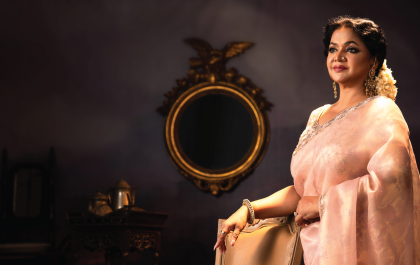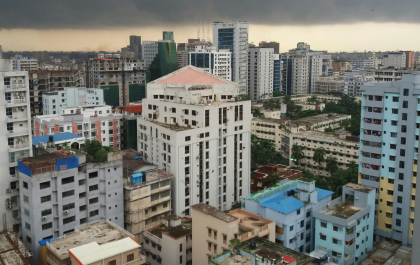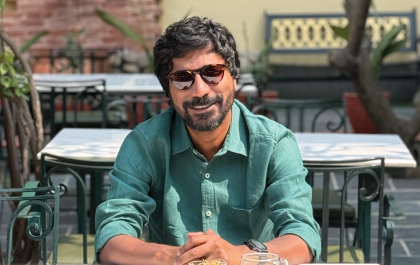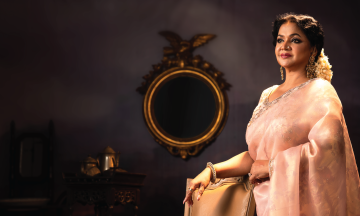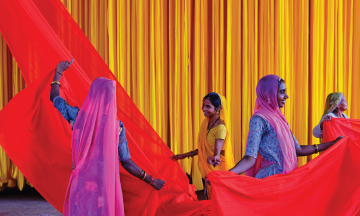Abak Hussain
Where would we be without language? Not just this language or that language, but any language. It’s hard to imagine, because most of us have no memory of a time before being plunged into a state of existence and a sense of self structured by language. For that, we would probably have to go back to the womb.
As soon as we are out and about, breathing the air of the physical world, words and sentences start giving shape to a confusing jumble of a world. Words draw boundaries, they set parameters – words downright create reality rather than just describe it.
Take a rainbow, for example. It is a spectrum where one color gradually fades into the next, an organic continuity, rather than one discrete color after another. And yet, as every school-child knows very well, the rainbow is composed of seven distinct colors: Red, orange, yellow, green, blue, indigo, and violet. They know that seven different crayons is all you need to draw a complete and perfect rainbow, and in a very human way, they are correct.
Because our perception of the world is cut up by language, and it makes a complex world a bit more manageable, it allows us to walk around trying to describe thoughts, emotions, or natural phenomena without our brains completely melting down each time trying to grapple with the unfathomable complexity of simply existing.
What a journey language has had. We may imagine ancient times, when early humans out of necessity used a combination of sounds and gestures to warn or inform each other of things mostly connected to survival. Tiger! Run! Food, there! Fire, here! Rain!

And we can imagine a gradual increase in complexity which grew alongside the development of tools and all the things that come along with civilization. At some point we developed words for feelings and intangible things a bit harder to pin down. We needed words like love, resentment, freedom, honesty, and if you are German, you needed words like schadenfreude or weltanschauung.
And so language built upon language, creating an increasingly complex web of ideas, where some words could only be defined through other words, rather than there being some direct correspondence to any object or phenomenon in the material world.
Language itself was put in a sacred position, and narratives were built around it – narratives of nationhood, motherhood, identity, sacrifice. Language, which helps us survive, also became a thing worth dying for.
And die for it we did. The history of Ekushey February is widely known by now. On this day in 1952, the Pakistan government gunned down young activists at the prime of their life. Their names are now etched in the history of this country forever: Salam, Barkat, Rafiq, Jabbar, Shafiur. Along with March 26 and December 16, the day of February 21 is one of the most significant dates in our national history, and perhaps the foundational event that created unstoppable momentum behind the idea of the Bangladeshi people as its own nation – our language being the beating heart of this national identity.
But for us it’s not just one day: Newspapers and talking heads frequently refer to February as bhashar maash (the month of language), and the Amar Ekushey Book Fair, one of the highlights of our festival calendar, runs throughout the month, much to the joy of book-buyers, authors, and publishers.
If Ekushey doesn’t show the emotional power of language, I don’t know what does. A common spoken language creates a strong bond among people, and over the years, we have used language to build up a cathedral in service to the glory of language itself: Think of the songs, the poems, the essays in childen’s textbooks and academic journals, the countless op-ed pieces and editorials that come out in February. Think of lyrics like: Amar bhaiyer rokte rangango Ekushey February, ami ki bhulite pari? With language reflecting upon language, we have come full circle.
There is, however, a danger here of an us-vs-them narrative. Language should never be used to oppress others, cause violence, or exclude. This was a lesson we learnt in Ekushey, and we stood up to defend our rights. But what is language? It is a system of symbols and signs, it is a way to understand the world. Language gives us instructions on how to swim or go from point A to B, and language lets us dive into existential philosophy.
Language is what lets us cut the rainbow up into seven parts, in Bangla be-ni-a-sha-ho-ko-la, instead of finding ourselves lost in the face of the infinity that exists within a rainbow, in the face of the colors that exist between colors.

Linguistic superiority is a political tool, one that is used to subjugate, or render inferior one party. For Bangladesh, I think, the real test in the coming years in an increasingly globalised world will be to not fall into that trap. No language is better than any other, and a knowledge and respect for multiple languages gives a fuller shape to our understanding of things. For example, in Bangla, as far as I know, there is no single word that quite captures the flavor and sentiment of “schadenfreude,” so thank God for the Germans.
I know I have zero chance of changing hearts and minds, especially with an English-language piece written in a niche magazine. Nor is it my goal. If you are one of the ones who has clicked on this link, or picked up a physical copy of the February issue of MW, and have come this far into the article, chances are, you already have a healthy respect for bilingualism, and so I am preaching to the choir.
The way I see it though, is that it is not my place to preach about language or direct its course – it is simply a river which I flow along, sometimes getting lost along its banks, sometimes gaining flashes of insight about its history, sometimes musing about its future and all the tantalising possibilities.
For all that linguists have uncovered, there is so much we still don’t know. What was going through the mind of the person who first wrote down the thing that might be considered a word? What is the future of language? What is the future of our own mother language? What will Bangla morph into in the years to come? What new words will we have in our collection, which suddenly blow open the possibilities for our dreams and our philosophies?
Abak Hussain is Contributing Editor at MW Bangladesh.





